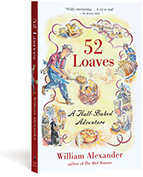
| Home | Books | Buy | Appearances | Op-eds | Reviews & Interviews | Bio | Contact & Media |

Read an excerpt from 52 Loaves |
From the Preface:
"Next!" My heart was pounding so hard at the airport security checkpoint, I was certain the TSA agent would see it thrusting through my jacket. "Laptop," I blurted out for no apparent reason, my voice cracking like a teenager on a first date as I placed my computer into the plastic tray. "Liquids." The TSA inspector held up my regulation baggie stuffed with three-ounce bottles, and nodded approvingly. I reached into my backpack and casually pulled out a half-gallon plastic container filled with a bubbling, foul-smelling substance. "Sourdough." I might just as well have said, "Gun!" "Uh-uh, you can't bring that on a plane!" a TSA official stationed at the next line called out. I wanted to say, "Who asked you?" but sensibly kept my mouth shut as I looked around nervously. Thanks to that blabbermouth, every passenger and TSA employee at the security checkpoint was looking my way. "Can he bring dough?" another inspector yelled. "A buzz had now started, with murmurs of "dough" audible from the passengers behind me, all of whom, I'm sure, hoped they weren't on my flight. A tense and chaotic ten minutes later, I found myself talking with a stone-faced supervisor. "Sourdough?" he sighed with the heavy air of someone who didn't want to deal with a situation, any situation. "Twelve years old!" I beamed. So that I could say it wasn't a liquid subject to the three-ounce rule, I'd added half a pound of flour to the wet sourdough before leaving the house. Unfortunately, this had the effect of stiffening it into something with an uncanny resemblance to plastique explosive. As the supervisor started to run a wand around it, I held my breath, half expecting it to beep myself. "A thirteen-hundred-year-old monastery in France is expecting this," I offered. His trained poker face remained flat, forcing me to pretend he'd asked why. "They managed to keep science, religion, and the arts alive during the Dark Ages, even risking their lives to protect their library from the barbarians who burned everything else in sight - but after thirteen centuries, they've forgotten how to make bread." Still no reaction. None. Trying to lighten the mood, I added, "The future of Western civilization is in your hands." That bit of hyperbole got his attention. "You're a professional baker?" My wife coughed. "Um, no." He arched an eyebrow. But no matter. Whatever transpired in the next few seconds, I was getting onto that plane with my starter. I had to. During nearly a year of weekly bread making, I'd disappointed my wife, subjected my poor kids to countless variations of the same leaden loaf and, most of all, had let myself down, time and time again, loaf after loaf, week after week. Well, I was not going to let down the monks at l'Abbaye Saint-Wandrille de Fontanelle. Granted, I was as unlikely a savoir of a monastery as you could imagine - a novice baker who'd lost his faith and hadn't set foot in a church in years, carrying a possibly illegal cargo of wild yeasts and bacteria practically forced on me by an avowed atheist - but nevertheless, I was determined to succeed, for I was on a mission. A mission from God. |